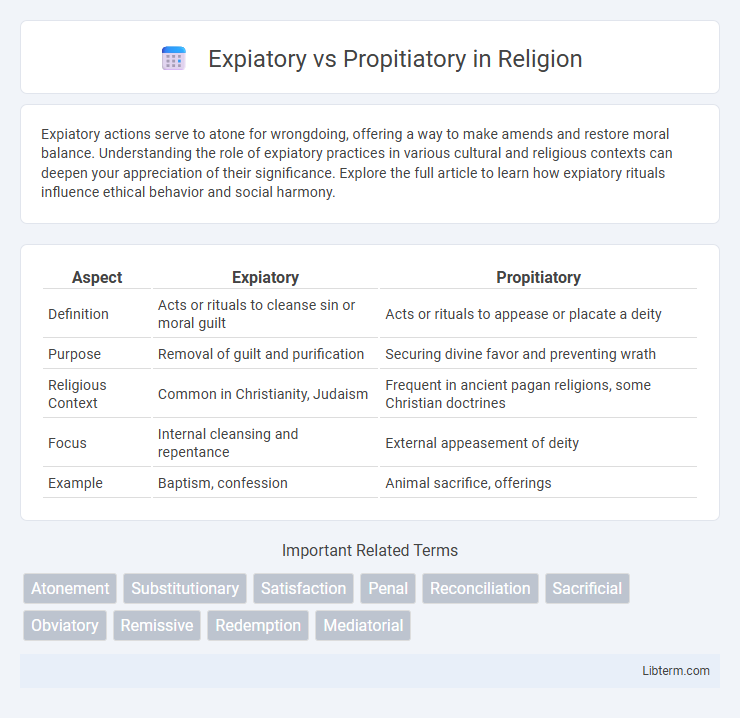Expiatory actions serve to atone for wrongdoing, offering a way to make amends and restore moral balance. Understanding the role of expiatory practices in various cultural and religious contexts can deepen your appreciation of their significance. Explore the full article to learn how expiatory rituals influence ethical behavior and social harmony.
Table of Comparison
| Aspect | Expiatory | Propitiatory |
|---|---|---|
| Definition | Acts or rituals to cleanse sin or moral guilt | Acts or rituals to appease or placate a deity |
| Purpose | Removal of guilt and purification | Securing divine favor and preventing wrath |
| Religious Context | Common in Christianity, Judaism | Frequent in ancient pagan religions, some Christian doctrines |
| Focus | Internal cleansing and repentance | External appeasement of deity |
| Example | Baptism, confession | Animal sacrifice, offerings |
Understanding Expiatory and Propitiatory: Key Definitions
Expiatory and propitiatory both refer to forms of atonement, but they differ in intent and effect; expiatory actions seek to remove guilt or sin, cleansing the individual or community from moral fault, while propitiatory actions aim to appease or placate a deity, seeking to turn away divine wrath or punishment. In theological contexts, expiation involves the removal of offense without necessarily altering the deity's disposition, whereas propitiation emphasizes reconciliatory sacrifice to gain favor or forgiveness. Understanding the distinction clarifies debates in religious studies about rituals, sacraments, and the nature of divine justice and mercy.
Historical Roots of Expiation and Propitiation
Expiation and propitiation have distinct historical roots shaped by ancient religious practices and cultural beliefs about sin and divine appeasement. Expiatory rituals, found in early Judaism and various pagan traditions, aimed to cleanse or atone for sins through sacrifices or symbolic acts, removing guilt from the individual or community. Propitiatory practices, prominent in Greco-Roman and ancient Near Eastern religions, involved appeasing deities to regain favor and prevent divine wrath, often through offerings or sacrifices intended to reconcile with an offended god.
Expiation in Religious Traditions
Expiation in religious traditions refers to the act of making amends or atoning for sins and moral wrongdoings through rituals, sacrifices, or acts of repentance. It emphasizes purification and restoration of the relationship between humans and the divine by removing guilt or pollution caused by transgressions. Various faiths, such as Christianity, Judaism, and Hinduism, incorporate expiatory practices to achieve spiritual cleansing and divine forgiveness.
Propitiation Across Different Faiths
Propitiation involves appeasing a deity or spirit to restore favor or prevent wrath, a concept found in many faiths such as Christianity, where Christ's sacrifice is seen as propitiatory, and in ancient pagan rituals that offered sacrifices to gods. In Hinduism, propitiation appears through rituals and offerings to deities like Agni and Vishnu to gain protection and blessings. Islamic teachings emphasize seeking Allah's forgiveness and mercy, aligning with propitiatory acts through sincere repentance and prayer.
Core Differences: Expiatory vs. Propitiatory
Expiatory rituals focus on cleansing or removing guilt through acts of atonement, while propitiatory rituals aim to appease or pacify a deity to gain favor or avert wrath. Expiation addresses the moral or spiritual impurity caused by wrongdoing, emphasizing purification and restitution. Propitiation involves offering sacrifices or prayers to satisfy divine anger and restore harmonious relations between humans and gods.
Theological Implications of Expiation
Expiation in theology emphasizes the removal or cleansing of sin through sacrifice, reflecting God's mercy and the believer's repentance. It signifies the restoration of a broken relationship between humanity and the divine without implying God's wrath is appeased. This contrasts with propitiation, which focuses on appeasing God's justice or anger, highlighting different interpretations of atonement in Christian doctrine.
Propitiatory Acts: Meaning and Significance
Propitiatory acts involve rituals or offerings intended to appease a deity or spirit, seeking to restore favor and avert divine wrath. These acts are significant in various religious traditions as they emphasize reconciliation and the prevention of punishment through goodwill. Their semantic importance lies in the concept of placating divine beings to maintain cosmic harmony and ensure blessings.
Scriptural Examples: Expiatory vs. Propitiatory Acts
Expiatory acts in Scripture emphasize purification and the removal of sin's guilt, as seen in Leviticus 16 where the scapegoat bears Israel's iniquities to cleanse the community. Propitiatory acts focus on appeasing God's wrath through sacrifice, such as the sin offerings detailed in Romans 3:25, where Jesus' sacrifice satisfies divine justice. Both serve distinct roles in atonement theology, with expiation addressing the removal of sin and propitiation addressing God's righteous response to sin.
Modern Perspectives on Expiation and Propitiation
Modern perspectives on expiation emphasize the process of cleansing or making amends for wrongdoing through symbolic acts or rituals, highlighting personal and social restoration. Propitiation focuses on appeasing a deity or supernatural force to gain favor or avert wrath, often involving offerings or sacrifices. Contemporary theological and psychological analyses explore both concepts as mechanisms for reconciliation, ethical commitment, and emotional healing within various cultural and religious contexts.
Expiation and Propitiation in Contemporary Worship
Expiation in contemporary worship emphasizes the cleansing of sin through Christ's sacrifice, offering believers forgiveness and renewal by removing guilt and impurity. Propitiation focuses on appeasing God's just wrath, highlighting Jesus' role as a flawless atonement that restores divine favor and reconciles humanity with God. Both concepts are integral to modern liturgy, shaping prayers, hymns, and sacraments that acknowledge sin's gravity while celebrating salvation's assurance.
Expiatory Infographic

 libterm.com
libterm.com